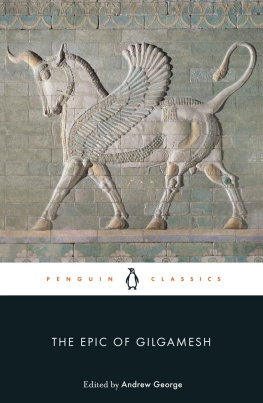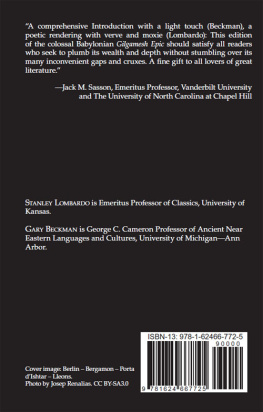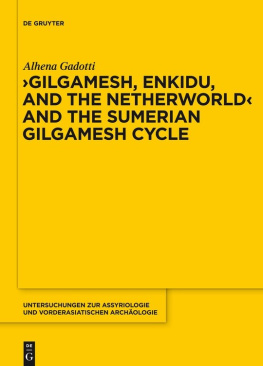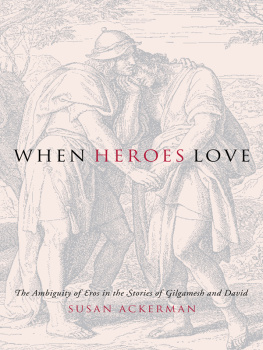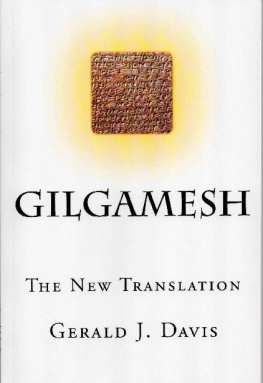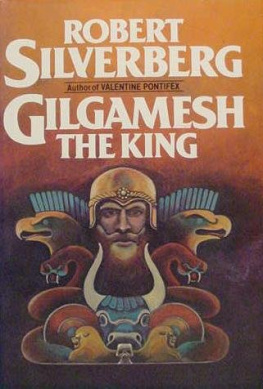Only a few fragments have been preserved, and very scanty information can be gathered from them. Tablet VII must have begun with Enkidu's account of his dream on the morning after the victory-jubilee in Uruk, and closed with the death of that hero, brought about by the goddess Ishtar. Pages 53 and 54 (cf. 55) of Professor Haupt's edition are said, by Dr. Jeremias, to belong to Tablet VIII, because the preceding column (a Column VI), being the obverse of the same tablet, speaks of the sickness and death of Enkidu (see Tablet IX). In Col. I, Enkidu calls on his friend to perform some heroic deed, worthy of his renown. They are halting in front of a forest gate, which Enkidu thus addresses:
Six gar [1 gar = 12 or 14 cubits] is thy height and two gar thy thickness.
Enkidu also says of it, "I know thee." And in Col. VI he moans:
"In good health I went forth, my friend. * * *
Then he called to Gilgamesh.
The few traces of the following lines still show that the hero received his wound in a fight which in fearful premonition "he had feared." The lament for the dead in Tablet XII shows that it must have been a very severe and unusual fight. Of his end, narrated, no doubt, on Tablet IX, it is said repeatedly in Tablet XII: "Earth has snatched him away."
TABLET I
Of this tablet only a few fragments are preserved. The correct beginning of the first tablet has been determined by Professor Haupt. It reads thus:
He who has seen the history of Gilgamesh,
[He who] knows all [that has happened to him]
* * * together * * *
[He who] has seen all kinds of wisdom,
[and] knows the mysteries and has seen what is hidden,
he bringeth news dating farther back [than the deluge?];
He has travelled far-distant roads,
and become weary * * *
[and now he has written] on a memorial tablet all the other things
* * * the wall of Uruk-supuru
[Lines ten and eleven are wanting.]
He spoke a charm which does not leave [him]
* * * the god who from distant days * * *
So far page 1 of Haupt's text; to the same tablet, as Haupt and Jeremias have pointed out, belongs page 51, narrating a siege of the city of Erech.
* * * his cattle forsook him.
* * * he went down to the river,
pushed into the river his boat and covered (it).
* * * full of sorrows he wept bitterly.
He returned (?) to the city of Gan-gan-na, which the enemy had destroyed completely.
The she-asses have trampled down their foals;
The cows in madness turn upon their calves.
And as the cattle were frightened, so were the people.
Like the doves, the maidens sigh and mourn.
The gods of Uruk, the strong-walled,
Assume the shape of flies and buzz about the streets.
The protecting deities of Uruk, the strong-walled,
take on the shape of mice and hurry into their holes.
Three years the enemy besieged the city of Uruk;
the city's gates were barred, the bolts were shot.
And even Ishtar, the goddess, could not make head against the enemy.
But Bel opened his mouth, said
to Ishtar, the queen, and spoke to her thus:
[The rest of the text is broken off; traces still allow to read (21) "Babylon the city of joy" (?). The death of the king must have created consternation in the city, described above, so graphically. Then Gilgamesh comes to the city as her saviour, and later on appears as her king.]
Introduction
The Gilgamesh Epic is the most notable literary product of Babylonia as yet discovered in the mounds of Mesopotamia. It recounts the exploits and adventures of a favorite hero, and in its final form covers twelve tablets, each tablet consisting of six columns (three on the obverse and three on the reverse) of about 50 lines for each column, or a total of about 3600 lines. Of this total, however, barely more than one-half has been found among the remains of the great collection of cuneiform tablets gathered by King Ashurbanapal (668626 B.C.) in his palace at Nineveh, and discovered by Layard in 18541 in the course of his excavations of the mound Kouyunjik (opposite Mosul). The fragments of the epic painfully gatheredchiefly by George Smithfrom the circa 30,000 tablets and bits of tablets brought to the British Museum were published in model form by Professor Paul Haupt;2 and that edition still remains the primary source for our study of the Epic.
For the sake of convenience we may call the form of the Epic in the fragments from the library of Ashurbanapal the Assyrian version, though like most of the literary productions in the library it not only reverts to a Babylonian original, but represents a late copy of a much older original. The absence of any reference to Assyria in the fragments recovered justifies us in assuming that the Assyrian version received its present form in Babylonia, perhaps in Erech; though it is of course possible that some of the late features, particularly the elaboration of the teachings of the theologians or schoolmen in the eleventh and twelfth tablets, may have been produced at least in part under Assyrian influence. A definite indication that the Gilgamesh Epic reverts to a period earlier than Hammurabi (or Hammurawi)3 i.e., beyond 2000 B. C., was furnished by the publication of a text clearly belonging to the first Babylonian dynasty (of which Hammurabi was the sixth member) in CT . VI, 5; which text Zimmern4 recognized as a part of the tale of Atra-h asis, one of the names given to the survivor of the deluge, recounted on the eleventh tablet of the Gilgamesh Epic.5 This was confirmed by the discovery6 of a fragment of the deluge story dated in the eleventh year of Ammisaduka, i.e., c. 1967 B.C. In this text, likewise, the name of the deluge hero appears as Atra-h asis (col. VIII, 4).7 But while these two tablets do not belong to the Gilgamesh Epic and merely introduce an episode which has also been incorporated into the Epic, Dr. Bruno Meissner in 1902 published a tablet, dating, as the writing and the internal evidence showed, from the Hammurabi period, which undoubtedly is a portion of what by way of distinction we may call an old Babylonian version.8 It was picked up by Dr. Meissner at a dealers shop in Bagdad and acquired for the Berlin Museum. The tablet consists of four columns (two on the obverse and two on the reverse) and deals with the heros wanderings in search of a cure from disease with which he has been smitten after the death of his companion Enkidu. The hero fears that the disease will be fatal and longs to escape death. It corresponds to a portion of Tablet X of the Assyrian version. Unfortunately, only the lower portion of the obverse and the upper of the reverse have been preserved (57 lines in all); and in default of a colophon we do not know the numeration of the tablet in this old Babylonian edition. Its chief value, apart from its furnishing a proof for the existence of the Epic as early as 2000 B. C., lies (a) in the writing Gish instead of Gish-gi(n)-mash in the Assyrian version, for the name of the hero, (b) in the writing En-ki-dabbreviated from dg Enki is good for En-ki-d in the Assyrian version,9 and (c) in the remarkable address of the maiden Sabitum, dwelling at the seaside, to whom Gilgamesh comes in the course of his wanderings. From the Assyrian version we know that the hero tells the maiden of his grief for his lost companion, and of his longing to escape the dire fate of Enkidu. In the old Babylonian fragment the answer of Sabitum is given in full, and the sad note that it strikes, showing how hopeless it is for man to try to escape death which is in store for all mankind, is as remarkable as is the philosophy of eat, drink and be merry which Sabitum imparts. The address indicates how early the tendency arose to attach to ancient tales the current religious teachings.


